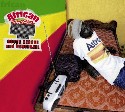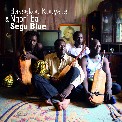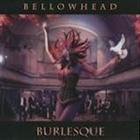|
| |
Please don't
forget to refresh your browser each time you visit this or other pages that are
regularly updated
Kekele: "Kinavana"
(Stern's Music).
For their third album
the Congolese veterans are exploring and celebrating
the Cuban roots of
Congolese music: "Kinavana" - from Kinshasa to Havana.
Indeed the focus of
the celebration is on the influential (and long deceased)
Cuban musician,
Guillermo Portabales, and all the titles here were either
written or recorded by
him. The result is a stunningly tasteful and engaging
album. The acoustic
guitar rings out in an African echo of the Cuban tres,
while the lilting
Latin rhythms move effortlessly from guajira to rumba to son.
The voices though are
pure Congo - big, soft and warm. The soloists, Manu
Dibango on sax and
Papa Noel on guitar, are top drawer and complement the
rhythms perfectly. In
addition to the regular four vocalists, Mbilia Bel (previously
a partner of Tabu Ley
Rochereau), Madilu 'System' Bialu and New Yorker, Isabel Martinez,
make fine
contributions
particularly on the beautiful near-cumbia of "Ba Kristo". The album
features new Lingala lyrics
for the tunes written
by the band, replacing the original Spanish lyrics.
A consummate album by
masters of Congolese rumba, this music will charm you into submission.
You won't
want to resist!
Nigel Wood
|
|
African Pearls 2:
Guinee - Cultural Revolution (Syllart/ Discograph). 
This compilation is a
wonderful display of the fruits of the first Guinean president
Sekou Toure's
ambitious and far-reaching policy for music and culture. From the
early 60s many bands
were established and their members were considered civil
servants working on
Sekou Toure's cultural policy. This created a rich cultural
framework, stimulating
musical development, and resulting in the fine performances
abounding on this 2 CD
set.
The album opens
uncompromisingly with the talking flute of the Ensemble Instrumental
du Mali before
settling into a gorgeous Spanish-tinged acoustic guitar piece with
Sekou
Kouyate and Abdoulaye
Diabate. Next up are the majestic vocal tones of Guinean griot,
Sory Kandia, recorded
in 1970. More praise vocals from Bah Sadio, another acoustic
gem from Sekou Diabate
and his brothers, and then an absolute classic from Bembeya Jazz, in
tribute to the
aforementioned Sekou.
With its hints of the 70s prog guitar sound, this instrumental will
win over any sceptical rock
fans in your life - an
African "Samba Pa Ti", but with a sense of humour! Miriam Makeba's
musicians pick up the tempo
for the Mandinka
classic, "Massani Cisse", before Miriam herself puts in a fine
performance in praise of Seckou Toure,
the "Black Hope". The
female backing vocalists on "Nina" are gloriously full-throated,
echoing and supporting Sory Kandia's
strident lead. A great
funky sax work-out from Momo Wandel follows before Kade Diawara and
Guinean Instrumental
Ensemble return us to
acoustic, and more traditional, themes and styles. "Kadia Blues" from
early Guinean star saxophonist,
Keletigui Traore, is
an elegant closer. And that's just the first disc!
The second disc is
just as good. It opens with another, earlier, classic from Bembeya
Jazz (1968). The funky afrobeat
highlife of the Super
Boiros, the wailing brass of the Horoya Band, the circumcision
work-out (!), "Wousse", all raise the
rhythmic temperature,
while more fine singers and guitarists take us through a selection of
ballads and gentle rumbas.
This is a treasure of
a compilation and provides serious competition for Network's excellent
"Golden Afrique" series.
Highly recommended.
Nigel Wood
|
|
African Rebel
Music
–
Various
artists Out Here OH 004
 A rare collection of Roots reggae and Dancehall from some of Africa’s
less known
Reggae artists. Featuring bands from just about every country on the
African
continent (most of whom I had never heard of) this album proves that
African
Reggae doesn’t have to have that sugary ‘pop’ feel that was so much part
of the
earlier African Reggae scene, especially by artists like Lucky Dube.
Other notable
omissions include Alfa Blondy, however, The Ivory Coast is still
represented by the
immaculate Tiken Jah Fakoly with a track from his new album Coup De
Geure (reviewed elsewhere on this site)
The emergent African Hip Hop scene is obviously playing a large part
here, influencing the lyrics and styles of
many acts, especially those from Senegal and its
near
neighbours.
Baaba Maal always insisted that reggae originated from
Senegal.
A fine ‘get down and dirty’
collection of
reggae music fit for any dancefloor. Phil B
A rare collection of Roots reggae and Dancehall from some of Africa’s
less known
Reggae artists. Featuring bands from just about every country on the
African
continent (most of whom I had never heard of) this album proves that
African
Reggae doesn’t have to have that sugary ‘pop’ feel that was so much part
of the
earlier African Reggae scene, especially by artists like Lucky Dube.
Other notable
omissions include Alfa Blondy, however, The Ivory Coast is still
represented by the
immaculate Tiken Jah Fakoly with a track from his new album Coup De
Geure (reviewed elsewhere on this site)
The emergent African Hip Hop scene is obviously playing a large part
here, influencing the lyrics and styles of
many acts, especially those from Senegal and its
near
neighbours.
Baaba Maal always insisted that reggae originated from
Senegal.
A fine ‘get down and dirty’
collection of
reggae music fit for any dancefloor. Phil B
|
|
Segu
Blue
– Bassekou Kouyate & Ngoni Ba - Out Here Records
OH007
 An
extraordinary CD of so-called Malian Blues, or traditional Malian music
as it
should really be known. ‘Ngoni Ba’ (which translates as The Big N’Goni)
is a quartet
that features four of Mali’s best known and loved N’Goni players.
Playing a style of
music from the Bambara region, where Bassekou was born, the vocals and
instrumentation is similar to what you would expect to hear in
traditional Manding
music but the structure is pentatonic and so much closer to the blues as
we know it.
The signature Malian sound of rippling strings is still evident
throughout this album
but this time not from the Kora, purely the N’Goni accompanied sparingly
here and there by the Imzad
(one stringed desert fiddle). The N’Goni predates the ubiquitous Kora by
some five or six hundred years
and is therefore a far more traditional instrument for music from these
parts and dates back to the 14th
century at the very least. Bassekou as a musician is in great demand
inside and outside of Mali, he played
N’Goni on Ali Farke Toure’s posthumous album ‘Savane’, was part of
Toumani Diabate’s Symmetric Trio
and featured in Taj Mahal’s ‘Kulanja’ project. Altogether a very nice
collection of songs that have an almost
’classical’ quality with some fine and expressive N’Goni playing, as you
would expect. The soaring vocals of
Zoumana Tereta giving an extra emotional edge to the track ‘Lament For
Ali Farka’ continuing the Malian
tradition of singing praise to the elders that passed before, now that
Ali Farka Toure has joined them.
And the title track of Segu Blue evidence enough that ‘The Blues’ must
surely have originated from the banks
of The Niger. Highly recommended for anyone 'into' Malian Music, the
Blues or both. Phil B An
extraordinary CD of so-called Malian Blues, or traditional Malian music
as it
should really be known. ‘Ngoni Ba’ (which translates as The Big N’Goni)
is a quartet
that features four of Mali’s best known and loved N’Goni players.
Playing a style of
music from the Bambara region, where Bassekou was born, the vocals and
instrumentation is similar to what you would expect to hear in
traditional Manding
music but the structure is pentatonic and so much closer to the blues as
we know it.
The signature Malian sound of rippling strings is still evident
throughout this album
but this time not from the Kora, purely the N’Goni accompanied sparingly
here and there by the Imzad
(one stringed desert fiddle). The N’Goni predates the ubiquitous Kora by
some five or six hundred years
and is therefore a far more traditional instrument for music from these
parts and dates back to the 14th
century at the very least. Bassekou as a musician is in great demand
inside and outside of Mali, he played
N’Goni on Ali Farke Toure’s posthumous album ‘Savane’, was part of
Toumani Diabate’s Symmetric Trio
and featured in Taj Mahal’s ‘Kulanja’ project. Altogether a very nice
collection of songs that have an almost
’classical’ quality with some fine and expressive N’Goni playing, as you
would expect. The soaring vocals of
Zoumana Tereta giving an extra emotional edge to the track ‘Lament For
Ali Farka’ continuing the Malian
tradition of singing praise to the elders that passed before, now that
Ali Farka Toure has joined them.
And the title track of Segu Blue evidence enough that ‘The Blues’ must
surely have originated from the banks
of The Niger. Highly recommended for anyone 'into' Malian Music, the
Blues or both. Phil B
|
|
Bellowhead: "Burlesque"
(Westpark Music).
 Bellowhead's
version of "Rambling Sailor" was possibly my favourite piece of music
from 2005. Jon Boden's
vocals are one of the joys of current English folk music, and
on that traditional
piece he invests it with a rawness and an attack which is positively
thrilling, especially
when accompanied by top-of-the-range folk musicians and powered
by a considerable
brass and percussion section. "Rambling Sailor" was the opening
number on a 5-track EP
("E.P.Onymous") which was only really designed as a demo for
securing live
bookings. They have now released their first proper album,
"Burlesque",
and it is an
unqualified success and a true 11-piece ensemble achievement. This is
as
powerful and dramatic
presentation of traditional material as you could wish for, much of it
(though not all)
arranged by John
Spiers and Jon Boden, who have a substantial folk reputation in their
own right. "Rigs of the
Time" sees Boden in
full flight riding atop a brass-powered riff in fine theatrical style
- the ringmaster of the
event. "Flash Company"
has a wild and demented edge in keeping with the hero's downfall.
"Across the Line"
(derived from a
Brazilian sea-shanty) is a haunting paean to the sailor's life. "Hopkinson's
Favourite" is an
excitingly creative
folk dance piece with Pete Flood's idiosyncratic drumming at the
centre. Those are some
of the highlights but
there isn't a weak track here. Bellowhead's
version of "Rambling Sailor" was possibly my favourite piece of music
from 2005. Jon Boden's
vocals are one of the joys of current English folk music, and
on that traditional
piece he invests it with a rawness and an attack which is positively
thrilling, especially
when accompanied by top-of-the-range folk musicians and powered
by a considerable
brass and percussion section. "Rambling Sailor" was the opening
number on a 5-track EP
("E.P.Onymous") which was only really designed as a demo for
securing live
bookings. They have now released their first proper album,
"Burlesque",
and it is an
unqualified success and a true 11-piece ensemble achievement. This is
as
powerful and dramatic
presentation of traditional material as you could wish for, much of it
(though not all)
arranged by John
Spiers and Jon Boden, who have a substantial folk reputation in their
own right. "Rigs of the
Time" sees Boden in
full flight riding atop a brass-powered riff in fine theatrical style
- the ringmaster of the
event. "Flash Company"
has a wild and demented edge in keeping with the hero's downfall.
"Across the Line"
(derived from a
Brazilian sea-shanty) is a haunting paean to the sailor's life. "Hopkinson's
Favourite" is an
excitingly creative
folk dance piece with Pete Flood's idiosyncratic drumming at the
centre. Those are some
of the highlights but
there isn't a weak track here.
This is a radical and
visionary take on English folk music and may well prove to be a
milestone in its evolution.
Top quality playing
and singing together with fascinating and often complex arrangements -
there are a lot of
heads and hearts
involved in this album and they knit together in exuberant and
triumphant fashion.
Nigel Wood
|
|
Tartit - Abacabok
(Crammed Discs).
 The
desert blues have received a lot of media coverage over the past few
years -
particularly in relation
to Ali Farka Toure, Tinariwen, and latterly Etran Finatawa,
but Tartit have been
pursuing their own style of it for a decade or more. They have
appeared at the Festival
in the Desert, which of course is a local gig for them, and
have released one album
prior to this one. Tartit are a Touareg ensemble of 5
women and 4 men, where
the women's voices are the predominant element, backed
by traditional tinde
drums. Voices and percussion may sound like a limited repertoire
over the length of an
album, but they also draw on a little electric guitar (from Afel
Bocoum on one track) and
bass on a couple of numbers. The result is a varied and
highly engaging album.
Rolling desert blues (a la Tinariwen) are present and correct,
but it is actually the
trance-inducing voice and percussion work-outs that are the most
exciting, particularly when
the women from the
surrounding encampments also get involved, chanting and ululating. The
slightly hoarse sound
of the female voices is
tremendously evocative, and the plaintive imzad violin is a perfect
accompaniment on the
the slower pieces.
Recorded in the desert and beautifully produced by Vincent Kenis (of
Congotronics fame).
Nigel Wood The
desert blues have received a lot of media coverage over the past few
years -
particularly in relation
to Ali Farka Toure, Tinariwen, and latterly Etran Finatawa,
but Tartit have been
pursuing their own style of it for a decade or more. They have
appeared at the Festival
in the Desert, which of course is a local gig for them, and
have released one album
prior to this one. Tartit are a Touareg ensemble of 5
women and 4 men, where
the women's voices are the predominant element, backed
by traditional tinde
drums. Voices and percussion may sound like a limited repertoire
over the length of an
album, but they also draw on a little electric guitar (from Afel
Bocoum on one track) and
bass on a couple of numbers. The result is a varied and
highly engaging album.
Rolling desert blues (a la Tinariwen) are present and correct,
but it is actually the
trance-inducing voice and percussion work-outs that are the most
exciting, particularly when
the women from the
surrounding encampments also get involved, chanting and ululating. The
slightly hoarse sound
of the female voices is
tremendously evocative, and the plaintive imzad violin is a perfect
accompaniment on the
the slower pieces.
Recorded in the desert and beautifully produced by Vincent Kenis (of
Congotronics fame).
Nigel Wood
|
|
|